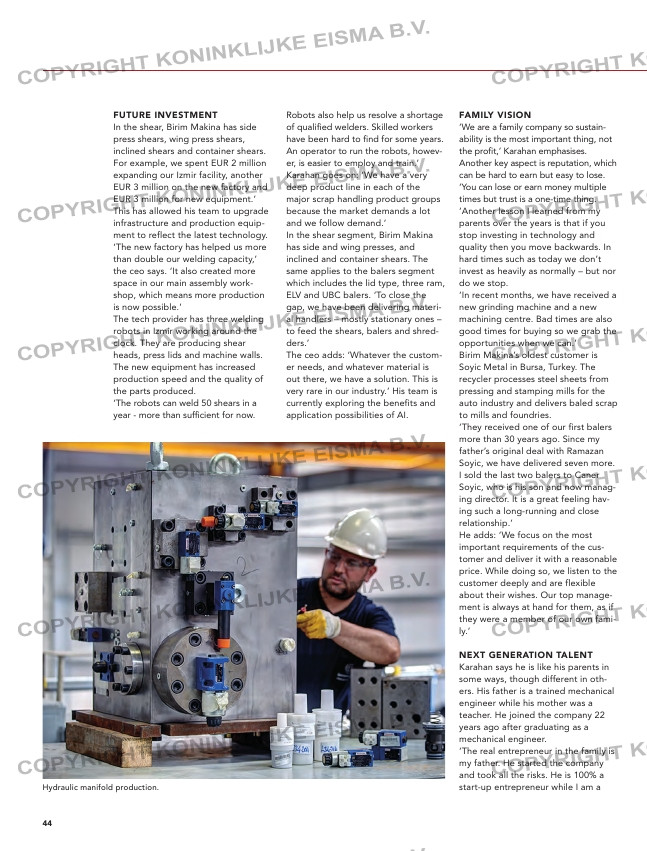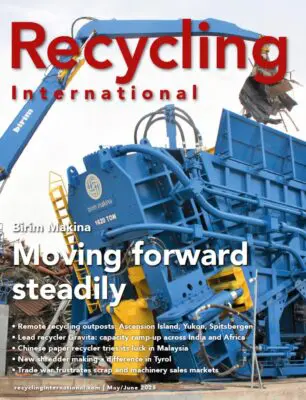Page 44 from: Recycling International May/June issue

44
FUTURE INVESTMENT
In the shear, Birim Makina has side
press shears, wing press shears,
inclined shears and container shears.
For example, we spent EUR 2 million
expanding our Izmir facility, another
EUR 3 million on the new factory and
EUR 3 million for new equipment.’
This has allowed his team to upgrade
infrastructure and production equip-
ment to reflect the latest technology.
‘The new factory has helped us more
than double our welding capacity,’
the ceo says. ‘It also created more
space in our main assembly work-
shop, which means more production
is now possible.’
The tech provider has three welding
robots in Izmir working around the
clock. They are producing shear
heads, press lids and machine walls.
The new equipment has increased
production speed and the quality of
the parts produced.
‘The robots can weld 50 shears in a
year – more than sufficient for now.
Robots also help us resolve a shortage
of qualified welders. Skilled workers
have been hard to find for some years.
An operator to run the robots, howev-
er, is easier to employ and train.’
Karahan goes on: ‘We have a very
deep product line in each of the
major scrap handling product groups
because the market demands a lot
and we follow demand.’
In the shear segment, Birim Makina
has side and wing presses, and
inclined and container shears. The
same applies to the balers segment
which includes the lid type, three ram,
ELV and UBC balers. ‘To close the
gap, we have been delivering materi-
al handlers – mostly stationary ones –
to feed the shears, balers and shred-
ders.’
The ceo adds: ‘Whatever the custom-
er needs, and whatever material is
out there, we have a solution. This is
very rare in our industry.’ His team is
currently exploring the benefits and
application possibilities of AI.
FAMILY VISION
‘We are a family company so sustain-
ability is the most important thing, not
the profit,’ Karahan emphasises.
Another key aspect is reputation, which
can be hard to earn but easy to lose.
‘You can lose or earn money multiple
times but trust is a one-time thing.
‘Another lesson I learned from my
parents over the years is that if you
stop investing in technology and
quality then you move backwards. In
hard times such as today we don’t
invest as heavily as normally – but nor
do we stop.
‘In recent months, we have received a
new grinding machine and a new
machining centre. Bad times are also
good times for buying so we grab the
opportunities when we can.’
Birim Makina’s oldest customer is
Soyic Metal in Bursa, Turkey. The
recycler processes steel sheets from
pressing and stamping mills for the
auto industry and delivers baled scrap
to mills and foundries.
‘They received one of our first balers
more than 30 years ago. Since my
father’s original deal with Ramazan
Soyic, we have delivered seven more.
I sold the last two balers to Caner
Soyic, who is his son and now manag-
ing director. It is a great feeling hav-
ing such a long-running and close
relationship.’
He adds: ‘We focus on the most
important requirements of the cus-
tomer and deliver it with a reasonable
price. While doing so, we listen to the
customer deeply and are flexible
about their wishes. Our top manage-
ment is always at hand for them, as if
they were a member of our own fami-
ly.’
NEXT GENERATION TALENT
Karahan says he is like his parents in
some ways, though different in oth-
ers. His father is a trained mechanical
engineer while his mother was a
teacher. He joined the company 22
years ago after graduating as a
mechanical engineer.
‘The real entrepreneur in the family is
my father. He started the company
and took all the risks. He is 100% a
start-up entrepreneur while I am a
more of a manager entrepreneur.
‘I work on regulations, rules and pro-
cedures that ensure the business is
sustainable. My goal is to scale up our
business and keep it running smooth-
ly through innovation. I feel real joy if
I make things perform better.
Optimisation is my main motivation.’
Karahan adds that family members
have always had their own specialisms,
allowing teamwork ‘while not stepping
on each other’s feet’. Karahan’s father
was focused on design and produc-
tion, his mother took care of finance,
and he tackled sales.
‘When my father wanted to slow
down, I took over the production side
of things as well. Mother’s role is still
the same. All three of us are still in
the company, although nowadays we
have a bigger team including my
cousin Sezen who was trained by my
mother to be part of the next genera-
tion.’
Karahan talks of high levels of trust
and transparency. ‘We can take deci-
sions very fast and act accordingly.
This is what customers love about us.
If they want something, they know
when it will be happening without los-
ing momentum. This reflects the
scrap industry, which is made up of
lots of family businesses.’
Karahan imagines his daughter
or his son (due in June) may take over
from him one day. ‘If they are inter-
ested in scrap and want to join, they
are more than welcome. If not, I will
support them either way.’
BIG EMOTIONS
Consolidation is a given in the scrap
industry, although Karahan believes
family businesses remain strong and
robust players. ‘We have to be practi-
cal. If the new generation is not join-
ing the family company or the compa-
ny has a weak market position, then
selling it to bigger players is a typical
way to keep it running. It is the
healthy way to secure the jobs of the
people and to keep competition in
the market.’
The ceo believes it can be difficult for
two family companies to merge
because there are ‘too many emo-
tions’ at stake. ‘When I look at the Hydraulic manifold production.
The new welding robot.
42-43-44-45_birimmakina.indd 44 10-04-2025 12:15



